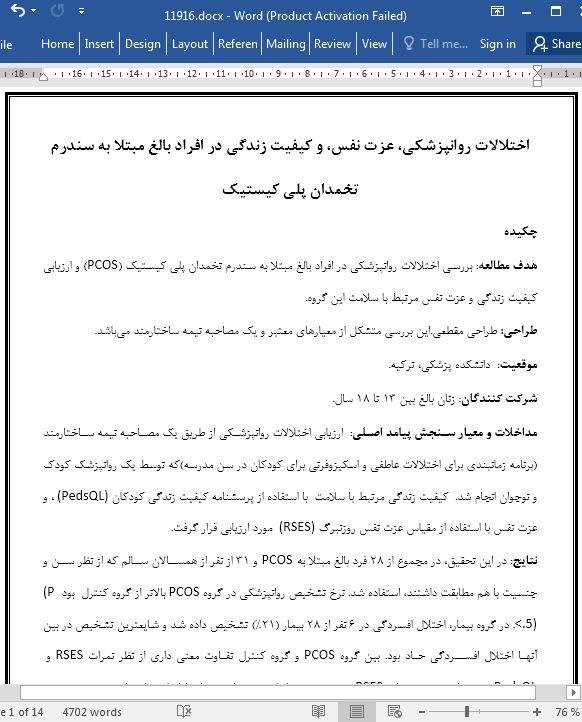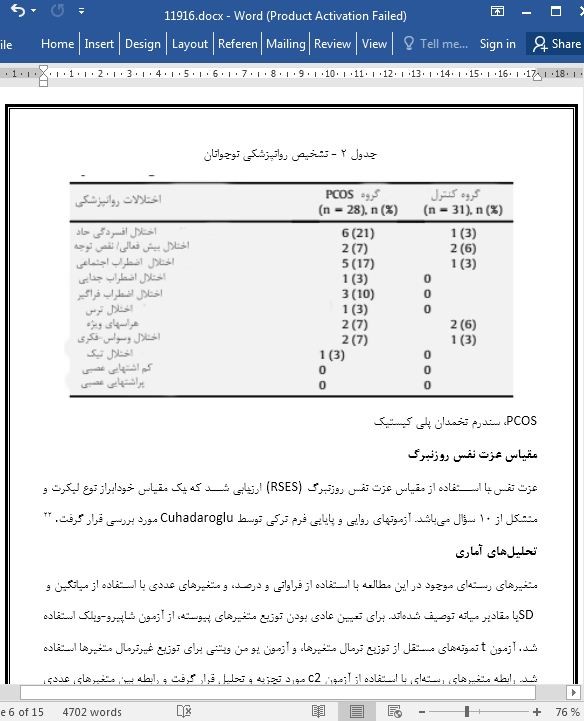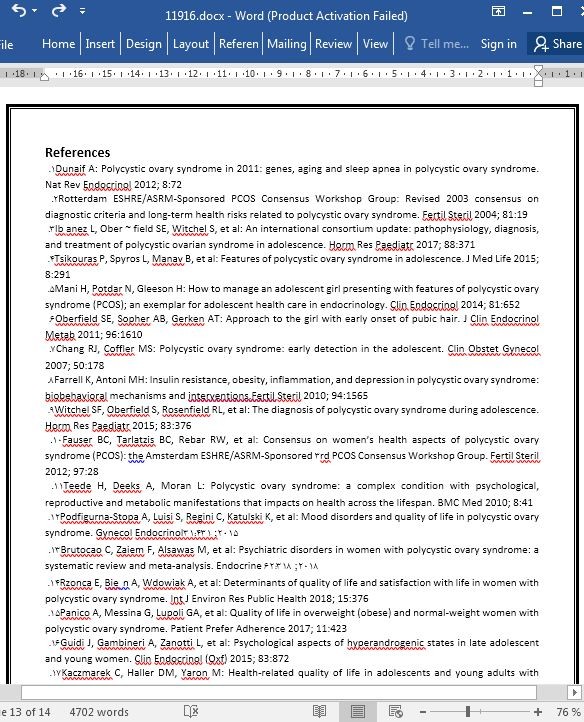
اختلالات روانپزشکی، عزت نفس، و کیفیت زندگی در افراد بالغ مبتلا به سندرم تخمدان پلی کیستیک
چکیده
هدف مطالعه: بررسی اختلالات روانپزشکی در افراد بالغ مبتلا به سندرم تخمدان پلی کیستیک (PCOS) و ارزیابی کیفیت زندگی و عزت نفس مرتبط با سلامت این گروه.
طراحی: طراحی مقطعی.این بررسی متشکل از معیارهای معتبر و یک مصاحبه نیمه ساختارمند میباشد.
موقعیت: دانشکده پزشکی، ترکیه.
شرکت کنندگان: زنان بالغ بین 13 تا 18 سال.
مداخلات و معیار سنجش پیامد اصلی: ارزیابی اختلالات روانپزشکی از طریق یک مصاحبه نیمه ساختارمند (برنامه زمانبندی برای اختلالات عاطفی و اسکیزوفرنی برای کودکان در سن مدرسه)که توسط یک روانپزشک کودک و نوجوان انجام شد. کیفیت زندگی مرتبط با سلامت با استفاده از پرسشنامه کیفیت زندگی کودکان (PedsQL) ، و عزت نفس با استفاده از مقیاس عزت نفس روزنبرگ (RSES) مورد ارزیابی قرار گرفت.
نتایج: در این تحقیق، در مجموع از 28 فرد بالغ مبتلا به PCOS و 31 از نفر از همسالان سالم که از نظر سن و جنسیت با هم مطابقت داشتند، استفاده شد. نرخ تشخیص روانپزشکی در گروه PCOS بالاتر از گروه کنترل بود (P <.5). در گروه بیمار، اختلال افسردگی در 6 نفر از 28 بیمار (21%) تشخیص داده شد و شایعترین تشخیص در بین آنها اختلال افسردگی حاد بود. بین گروه PCOS و گروه کنترل تفاوت معنی داری از نظر نمرات RSES و PedsQLوجود نداشت. بین نمرات RSES و تصویر بدن رابطه معنی داری در ارتباط با موهای زائد (هیرسوتیسم) ، آکنه و شاخص توده بدنی مشاهده نشد.
نتیجه گیری: افراد بالغ مبتلا به PCOS ، غالباً از اختلالات روانپزشکی رنج میبرند. پزشکان باید از این امر آگاه باشند که افراد بالغ مبتلا به PCOS تا حد زیادی در معرض خطر ابتلا به افسردگی و اضطراب حاد قرار دارند.
مقدمه
سندرم تخمدان پلی کیستیک (PCOS) اختلال شایعی است که تقریباً 7٪ از زنان سراسر جهان را در سالهای تولید مثل خود به آن مبتلا می شوند. 1 ویژگیهای بالینی مشخصه آن عبارتند از دورههای قاعدگی غیرعادی، و یافتههای بالینی یا آزمایشگاهی مربوط به سطح بالای آندروژن.2 پاتوژنز PCOS مشخص نیست اما اعتقاد بر این است که این سندرم حاصل تعامل بین عوامل محیطی و ژنتیکی است. وراثت پذیری PCOS در بررسی دوقلوهای یک تخمکی و دو تخمکی، در حد متوسط گزارش شد. 3
Abstract
Study Objective To assess psychiatric disorders in adolescents with polycystic ovary syndrome (PCOS) and evaluate health-related quality of life and self-esteem in this group.
Design Cross-sectional design. The survey was composed of validated measures and a semistructured interview.
Setting University School of Medicine, Turkey.
Participants Female adolescents aged 13-18 years.
Interventions and Main Outcome Measures Assessment of psychiatric disorders through a semistructured interview (Schedule for Affective Disorders and Schizophrenia for School Age Children) conducted by a child and adolescent psychiatrist. Health-related quality of life was measured using the Pediatric Quality of Life Inventory (PedsQL) and self-esteem was measured using the Rosenberg Self-Esteem Scale (RSES).
Results A total of 28 adolescent with PCOS and 31 age- and sex-matched healthy peers were recruited. The psychiatric diagnosis rate was higher in the PCOS group than in the control group (P < .5). In the patient group, 6 of 28 patients (21%) were diagnosed with depressive disorder and the most common single diagnosis was major depressive disorder. There were no significant differences in the PCOS and control groups in terms of RSES and PedsQL scores. There was no significant relationship between RSES scores and body image related to hirsutism, acne, and body mass index. Also, there was no significant relationship between PedsQL scores and hirsutism, acne, and body mass index.
Conclusion Adolescents with PCOS frequently experience psychiatric disorders. Physicians should be aware that adolescents with PCOS are at a high risk for major depression and anxiety disorders.
Introduction
Polycystic ovary syndrome (PCOS) is a common disorder that affects almost 7% of women in reproductive years around the world.1 The characteristic clinical features include abnormal menstrual periods, and clinical or laboratory findings of elevated androgen levels.2 The pathogenesis of PCOS is unclear, but it is believed that the syndrome is the result of interactions between environmental and genetic factors. Moderate heritability of PCOS was reported in studies of monozygotic and dizygotic twins.3
چکیده
مقدمه
موضوعات و روشها
شرکت کنندگان
معیارها و ابزارها
برنامه زمانبندی برای اختلالات عاطفی و اسکیزوفرنی برای کودکان سن مدرسه، نسخه حال و طول عمر
پرسشنامه کیفیت زندگی کودکان
مقیاس عزت نفس روزنبرگ
تحلیلهای آماری
نتایج
بحث
نتیجه گیری
منابع
Abstract
Introduction
Materials and Methods
Participants
Measures and Instruments
Schedule for Affective Disorders and Schizophrenia for School Age Children Present and Lifetime
The Pediatric Quality of Life Inventory
Rosenberg Self-Esteem Scale
Statistical Analyses
Results
Discussion
Conclusion
References
- ترجمه فارسی مقاله با فرمت ورد (word) با قابلیت ویرایش، بدون آرم سایت ای ترجمه
- ترجمه فارسی مقاله با فرمت pdf، بدون آرم سایت ای ترجمه



